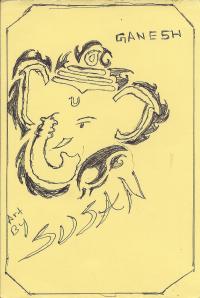1. Spend some time conversing with your translator in advance of your workshop.
This helped me tune my ear to his English accent, speed of speach, inflections and test his understanding of my English. I also had to get use to words that were used in different contexts or were infrequently used in my language environment.
2. Come prepared for everything
I spoke to those before me, brought what I thought I needed to facilitate a couple of workshops but never expected they would have screwed a whiteboard overtop of the chalk board. Thankfully, the facility had extra whiteboard markers.
3. Get in the groove
There are a lot of cultural learnings including how time is used. From starting an hour after the announced time with no apparent discomfort (except in me), hand shakes that exclude the women in the room, no one showing up with their own paper or pens, to dancing and singing during a break for tea. This is how business is done there and the sooner I got in the groove the sooner the harmony was restored and we could focus on learning.
4. Learn some key words and simple phrases
While trekking the week before in the Annapurna region I made an effort to learn some simple phrases such as:
- What is your name
- My name is Erin
- I am from Canada
- How do you say (or what do you call this…)
- Greetings and manners
The one I didn’t expect to be asked repeatedly was “how old are you”. I didn’t learn to count that high in Nepali!
5. Bring gifts
Gifts are exchanged when people come together. Next time I would bring more items that
represent my home country and hand them out when it was appropriate. This was done a lot more than I was expecting and in some very creative fashions. Six teenage boys in Sundarbazaar gave me gifts for both my teenage son and for myself. I was overwhelmed by their thoughfulness and generosity. A teacher wrote a song and sang it during tea time. A student drew a picture of the Hindu God Ganesh. A woman gave me an artisan handbag from Mizoram. The people are very generous and thoughtful.
The last item that helped me coach more effectively was getting a glimpse into what’s important to them, meaning their core values. I think it is quite rare to have a leader in North Amercian say being patient is an important attribute when implementing change. I wrote a piece on this so if you interested you can read further on it in the blog titled Getting Everyone on the Same Page.







Thanks for these thoughts Erin. Although my work in India and Nepal was not coaching, I can relate very much to what you say about patience, generosity of spirit and the kind hearts of the people. I learned too, that there are some universal experiences that we share with people regardless of culture and language differences. Your comments (especially about learning patience) reminded me of a saying by Robert M. Pirsig “The only Zen you can find on the tops of mountains
is the Zen you bring up there”.
Sharon Moore said “The only Zen you can find on the tops of mountains
is the Zen you bring up there”.
I had the privilge to get to know Erin Wadell at a mountain trekk in Nepal. She practices what she preaches . Although I experienced the Biblical ” Peace that passes understanding in my heart”, Through our talks /chats she helped me finding my Zen again . She surely had brought hers along and God sent her as an Angel in my life, during a dificult time, to swiftly help me.